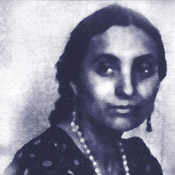Bronisława Wajs
Bronisława Wajs | |
|---|---|
 | |
| Born | 17 August 1908 Lublin, Lublin Governorate Congress Poland |
| Died | 8 February 1987 (aged 78) Inowrocław, Poland |
| Occupation | Poet, singer |
| Nationality | Polish–Romani |
| Period | 20th century |
Bronisława Wajs (17 August 1908, Lublin – 8 February 1987, Inowrocław), commonly known by her Romani name Papusza (meaning Doll), was a Polish-Romani classic poet and singer.[1]
Life
Bronisława Wajs grew up nomadically with her family in Poland as part of a kumpania, or band of families. She was literate, unusual for Polska Roma of that time. She learned to read by trading chickens in exchange for lessons with local villagers. This was frowned upon and whenever she was found reading she was beaten and the book destroyed. She was married in a traditional ceremony at 15 to a revered harpist named Dionizy Wajs, who was 24 years her senior.[2] She was very unhappy with the marriage and took to singing as an outlet for her frustrations, with her husband often accompanying her on harp. Soon after learning to sing she began to compose her own ballads and songs based on traditional Romani story-telling and songwriting.
In 1949 Papusza's kumpania settled in Żagań in Western Poland.[2] That same year, she was heard by the Polish poet Jerzy Ficowski, who instantly recognized her talent.[3] Many of her poems dealt with "Nostos" (Greek for "a return home"), a theme common in Romani poetry. Although Roma used this to describe the yearning to return to the open road, Ficowski saw this as Papusza yearning to be settled down, to no longer be nomadic. He translated and published several of her poems in a magazine called Problemy along with an interview with Polish poet Julian Tuwim. Although the poem made Papusza known for the first time among the Polish audience, the interview and, above all, the Romani-Polish minidictionary attached to it, caused a negative turn in the poet's life, as she was accused of revealing the secrets of her native culture to the gadjos. Her activities were associated by some Roma with the simultaneous moves of the Polish communist government that found its culmination in September 1952 (known variously as 'Action C', or "The Great Halt", which aimed at creating the first census of the Polish Sinti and Roma, their registration and obligatory assignment of ID cards). Accusations of Papusza and Ficowski as supporters, even unintentional of the forced settlement of Roma are even now not uncommon, although the law imposing a ban on wandering was not introduced until 1964. Similar legislation began to spring up in neighboring countries such as Czechoslovakia (1958), Bulgaria (1958), and Romania (1962). Papusza herself settled in the western Polish city of Gorzów Wielkopolski, spending most of the rest of her life in a house on Kosynierów Gdyńskich street which today bears a plaque dedicated to her. In 1962, Pupusza joined the Polish Writers' Union.[2]

The Roma community soon began to regard Papusza as a


Works
Most of Papusza's work involved traditional Roma formats along with some unusual aspects such as writing in singular form. Most of her work dealt with nostalgia, longing, and (especially) feeling lost.
"...the water does not look behind
It flees, runs farther away
Where eyes will not see her,
the water wanders..."
She published poems frequently from the late 1940s to the mid-'50s, when she was removed from Roma life, first in Polish literary magazines and then in books of her own. She published again for a short time in the late '60s.
Legacy
- In 1974, a documentary film entitled Papusza was directed by Maja Wójcik and Ryszard Wójcik. It presents the customs and life of the Roma community. The main protagonists of the film were Bronisława Wajs and Jerzy Ficowski.[4]
- In 1991, a film Historia Cyganki (A Gypsy Girl's Story) was directed by Greg Kowalski featuring music by Jan Kanty Pawluśkiewicz.[4]
- Romani theater "Romance" in Ukraine made a performance about Papusza.
- There is a monument to Papusza in Gorzów Wielkopolski.
- Romani cultureand lifestyles.
- A Polish film about her life, titled Papusza, was released in 2013. It was directed by Joanna Kos-Krauze and Krzysztof Krauze and stars Jowita Budnik in the title role.[5]
- In 2013, Andżelika Kuźniak published a book, Papusza, about the life and literary legacy of Bronisława Wajs.[4]
External links
- Biography with quotes from Ficowski Archived 6 February 2012 at the Wayback Machine
- Review of her work and its meaning
- FemBiography (German) with links, quotes and literature
- Papusza at Culture.pl
See also
- Zoli, a novel loosely based on the life of Wajs
References
- ^ "Bronisława Wajs".
- ^ a b c d "Dziewczyna, która "zdradziła tajemnice Cyganów"". Onet Podróże (in Polish). 26 October 2022. Retrieved 6 June 2023.
- ^ "Papusza – wyklęta przez bliskich - Historia - polskieradio.pl". polskieradio.pl (in Polish). Retrieved 6 June 2023.
- ^ a b c "Papusza (Bronisława Wajs)" (in Polish). Retrieved 21 March 2022.
- ^ "PAPUSZA" (in Polish). Retrieved 21 March 2022.
